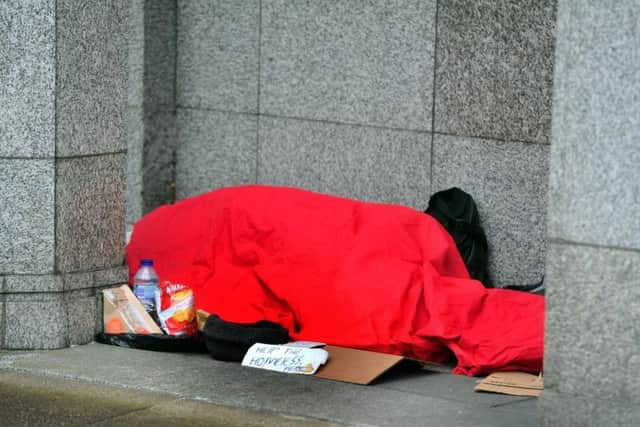Illness, suicide and murder - why homeless and rough sleepers in Leeds and UK are dying
and live on Freeview channel 276
The Bureau of Investigative Journalism today released the final count in its Dying Homeless project, which reveals that 796 people are known to have died homeless in the last 18 months across the UK - equating to almost 11 people a week.
Eleven of the 22 such estimated deaths in Yorkshire and the Humber tracked over 18 months occurred in Leeds, with the latest just last week.
Advertisement
Hide AdAdvertisement
Hide AdNew research, undertaken by University College London (UCL) and seen exclusively by the Bureau, also found homeless people are much more likely to die of treatable conditions than even the most economically-deprived housed population.


Almost a third of the deaths UCL explored were from treatable illnesses such as tuberculosis, pneumonia or gastric ulcers, which could have improved with the right medical care.
Suicide and murder accounted for many other deaths beyond that proportion.
Matt Downie, director of policy and external affairs at the charity Crisis, said: “ “To know that so many vulnerable people have died of conditions that were entirely treatable is heart-breaking. What’s worse, we’re unable to learn the lessons needed to prevent these senseless deaths from recurring. Governments must urgently expand the systems used to investigate the deaths of vulnerable adults to include all those who have died while homeless,”
Advertisement
Hide AdAdvertisement
Hide Ad“But ultimately, 800 people dying homeless is unacceptable - we have the solutions to ensure no one has to spend their last days without a safe, stable roof over their head. By tackling the root causes of homelessness, like building the number of social homes we need and making sure our welfare system is there to support people when they fall on hard times, governments in England, Scotland and Wales can build on the positive steps they’ve already taken to reduce and ultimately end homelessness.”
“As it comes to an end, it is difficult to overstate the importance of the Dying Homeless Project, which has shed new light on a subject that was ignored for too long."
The data has been collected after the Bureau, which works with news organisations such as the Yorkshire Evening Post, discovered that no single body was recording if and when people were dying while homeless – although last October the Office for National Statistics began collating such figures.
The Bureau will now pass on the project to the Museum of Homelessness.
Advertisement
Hide AdAdvertisement
Hide AdFor its study, academics at UCL explored nearly 4,000 in-depth medical records for 600 people that died while homeless in England, between 2013 and 2017.
The research found that homeless people are much more likely to suffer heart disease and strokes than equivalently economically disadvantaged, housed populations. A fifth of the deaths explored by UCL were cancer-related. Another fifth died from digestive diseases such as intestinal obstruction or pancreatitis.
Around 27 per cent of the Bureau’s total were under 40 when then they died.
When counting, the Bureau used Crisis’ definition of homelessness as including: people sleeping rough, those registered as statutory homeless by their local authority and those who are living long-term as “hidden homeless” such as “sofa-surfers”.